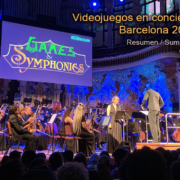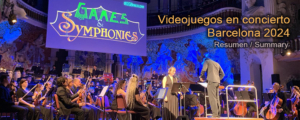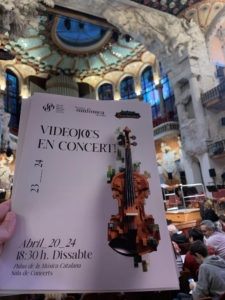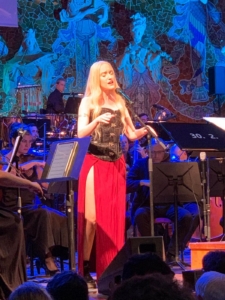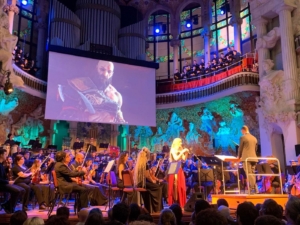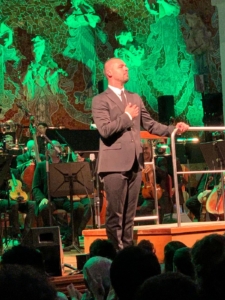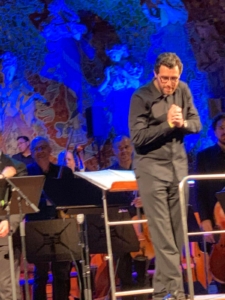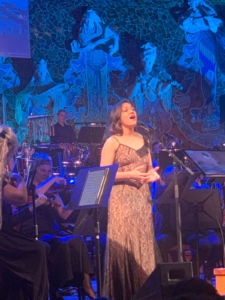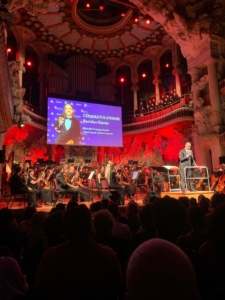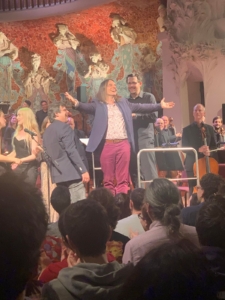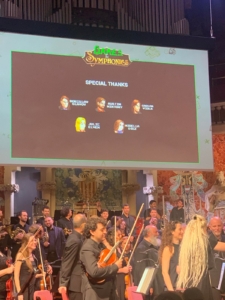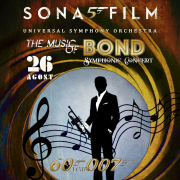Video Games in Concert! – Barcelona 2024 – Special Article
On Saturday, April 20, the Orquestra Simfònica del Vallès in collaboration with Games & Symphonies, celebrated ‘Video Games in Concert!’ at the Palau de la Música de Catalana in Barcelona, Spain (read more).
A very special concert conducted by Adrián Ronda, with the participation of the Cor Jove Amics de la Unió (Marta Dosaiguas, conductor), the singers Julie Elven and Mirella Díez, and the guest composers Carlos Viola, Borislav Slavov, and Austin Wintory.
Our colleague Coque Cano was there and leaves us here an extensive special article exclusively for SoundTrackFest.
Video Games in Concert! - by Coque Cano
That film music has taken over the concert halls is a fact and it seems to have enough audience to maintain and even grow in popularity. Names like John Williams, Ennio Morricone, Joe Hisaishi, or Hans Zimmer sell tickets and behind them are thematic or monographic concerts, and the music of many other classical and current composers are finding a place that until not so long ago was elusive to them.
The popular impact and the quality of much film music have paired spectacularly with symphonic concerts and the great classical music venues, and it was only a matter of time before this wave reached the so-called “Eighth Art”, that is, the video game industry, as successful or even more successful than cinema and with as good or even better (especially nowadays) soundtracks.
The concert at this article is the demonstration of the above, and of the existence not only of wonderful scores but of composers specialized in music for videogames, a genre that in many aspects allows much better developed works, with the strength of true symphonies and a certain operatic air. Something that became evident last April 20 at the Palau de la Música Catalana.
Doing a little historical review, the year that changed the way of approaching the scores for games, at least in the USA, was 1995, when the great Bruce Broughton composed and conducted in front of the Sinfonia of London the first eminently orchestral video game soundtrack, specifically for “Heart of darkness”. A couple of years later, although they were actually released earlier, came the scores for “Lost World: Jurassic Park” composed by a then unknown Michael Giacchino, and “Total Anhilililation” whose author Jeremy Soule became the first exponent of a particular star system of composers focused on the video game industry. Although it is fair to say that a little earlier, in 1993, none other than Joe Hisaishi had already tackled in a partially orchestral way his soundtrack for “Far East of Eden”.
With these precedents of the highest quality it did not take the industry long to provide games with great symphonic frescoes, huge formations with choirs, with film composers such as Hans Zimmer, Brian Tyler, Christopher Lennertz, or Harry Gregson Williams working for the medium, and creating on the other hand a fertile cast of musicians who have dedicated their work mostly to video games, such as Austin Wintory, Chance Thomas, Gordy Haab, Grant Kirkhope, Chris Velasco, or Jesper Kyd, to name a few.
This preamble serves to demonstrate that the bet produced by “Games & Symphonies“, and that in the concert mentioned above enjoyed the usual solvency and good work of the Orquesta Simfònica del Vallès and the Cor Jove Amics de la Unió, conducted (with some exceptions that we will talk about) by their alma mater Adrián Ronda, was a great event, full of spectacular music, epic, romantic, sometimes delicate, and mostly lavish, emphatic, also ethnic, but above all suitable to be performed in such a special hall as the Palau de la Música.
The concert program was as follows:
From the initial retro-suite dedicated to Arcade games (mostly works by Japanese composers for such iconic games as Pac-Man or Tetris), to a very successful and welcome encore as was Jeremy Soule‘s masterpiece “Skyrim“, the long and demanding program was a constant party, I would even say increasing, with a second part that, at least for the undersigned, was superior to the first, which was also magnificent on the other hand.
It was approximately three hours of a great selection that, as is logical, would be more or less likeable depending on personal tastes, but that was very balanced, with that fantastic start reviewing the music of the arcade games with very meritorious and successful symphonic adaptations, which was followed by a selection of themes composed by Greg Edmonson for the successful “Uncharted” saga, which in its second part has one of the best OSTs of the genre. Here it was already glimpsed what could offer a concert full of melodic strength and thematic variety.
And even more so if the depth of the Vallès Symphony and the extraordinary Cor Jove were occasionally joined by solo singers such as Julie Elven or Mirella Díez, who did their part in some of the original compositions performed in the concert, thus achieving a more complete experience, if possible, and more akin to the versions created by the composers.
We could enjoy an almost mimetic suite of the elegiac “Horizon” by Dutch composer Joris de Man, with the voice of Julie Elven, followed by “Dying Light 2” by Olivier Deriviere, with apocalyptic crescendos, “Shadow of the Colossus” by an inspired Kow Otani, which was one of the most majestic and intense dramatic moments of the evening.
Next, another suite for concert, in this case of the second part of Assassin’s Creed, by the initial composer of the saga, Jesper Kyd, music of medieval dyes fused with the orchestra that we could already enjoy on May 13, 2023 in the thematic concert dedicated to this video game series (read more) which is undoubtedly one of the most enduring and famous of today.
Then came another of the great pieces of the evening, from a composer who has demonstrated in recent years his versatility and talent working in a more than inspired way for film, television and video games. We are talking about Bear McCreary and his recent “God of War Ragnarok”, which raised to Valhalla a gamer community that crowded the musical temple of Barcelona with an undeniable sold out.
“Celeste” by Lena Raine was a change towards less opulent postulates and was very dynamic with the images of the game on screen (something that happened throughout the concert but in this case had special prominence almost as if the audience was playing to the sound of the music).
With the second thematic Suite programmed, in this case dedicated to the soundtracks for the production company Blizzard Entertainment, creator among others of the games of the sagas “World of Warcraft”, “Diablo”, and “Starcraft”, with special prominence of the composer Russell Brower, we reached the end of an excellent first part of the concert. At this moment we could check the euphoric mood of an unusual audience in these parts and that seemed to have moved, as a collective meeting, from various parts of the country.
Properly we could speak of a first concert, as it had the standard duration of any of those usually programmed for film music, but as we have already advanced we were only halfway through… and the best was yet to come.
The second part started with a major piece of gamer music, nothing less than a fairly complete suite of the best moments composed by Nobuo Uematsu and to a lesser extent Yoko Shimomura for “Final Fantasy”, a true classic that in Japan has legions of fans (we are talking about the music, even beyond the game itself) and of which are usually held monographic concerts with symphonic suites similar to the one masterfully performed by the Orquesta Simfònica del Vallès under the baton of a very intoned Adrián Ronda.
And if this was a great entry after the break, the next programmed work was not far behind, which also gave us the opportunity to see live its composer, the American Austin Wintory. Nominated for a Grammy for best composition for audiovisual media, “Journey” is a deeply emotional and spiritual score, with initial prominence of the cello and that benefits from the enveloping female soloist voice in a constant dialogue with the strings, which submerged the room in an almost cathartic state. Undoubtedly a moment to remember, that a cheered Wintory knew how to create in front of musicians who embroidered it.
The third title of this second part was a premiere that again had the presence of its author, the Sevillian Carlos Viola, who although he did not come up to conduct his work, was rewarded with an affectionate applause after the interpretation of a suite of his score for the game “Blasphemous”, which introduced moments of guitar without losing an iota of its apocalyptic breath. After this first Spanish contribution to the program, the second came next, which could not be more different, the composition by David García Díaz for “Rime”, with the wonderful voice of Mirella Díez, who interpreted the delicate song entitled “the song of the sea“, repeating her work in the original soundtrack of the game.
A more orchestral version of the original and fresh soundtrack composed by the young Toby Fox for “Undertale” gave way to the other great moment of the evening, none other than the recent winner of the Bafta award “Baldur’s Gate III”, an impressive symphonic work with choirs and certain reminiscences to Miklós Rózsa, which was a real tour de force for orchestra and choir, and which also, in an act of appreciation among peers, was conducted again by Austin Wintory at his express request, with the emotional presence in the audience of its author Borislav Slavov. The moment that was created after the apotheosis at the end of the piece, with the audience giving a standing ovation to both Slavov and Wintory, justifies by itself a concert that of course was not yet over.
There were three works left on the program, the first of a markedly dramatic nature, a work by the double Oscar-winning Argentine composer Gustavo Santaolalla, who showed another side of his music to which perhaps we are not so accustomed, while the second again demanded all the epicness of the orchestra and choir, in an outstanding symphonic score composed by Christopher Tin for the game “Civilization VI”. The fabulous main theme known as “Sogno di volare” was interpreted, a hymn that sounded like glory in the final phase of the concert.
And we arrived at the last official piece, and with it more superlative music, “Starfied Medley”, a pure science fiction score that brings back compositions of the genre ranging from Jerry Goldsmith to Vangelis, and that showed all the good that the vast world of video games can offer, especially if there are composers of the stature of Inon Zur behind it.
What undoubtedly would have been a great end to a great concert, was left as a prelude to an encore not less cheered for expected, as was the aforementioned “Skyrim“, the hallmark of symphonic and epic music composed for video games, which enabled the inclusion of the essential Jeremy Soule as a culmination of what, after more than three exhausting hours, became a memorable night.
The long ovation with all the artists already on stage, including here also the “guests” Carlos Viola, Borislav Slavov, and Austin Wintory, who together with the female soloists Mirella Díez and Julie Elven saw on screen a special thank you with their virtual avatar of more than reasonable resemblance, did not seem so much a “game over” but a “to be continued”, since it is evident that concerts for video game music, if they are half as good as the present, have an assured future ahead of them.
And to our delight, Games & Symphonies has announced that it will return to the Palau de la Música Catalana on Saturday, April 5, 2025 – mark the date in your calendars now!
Article and pictures by Coque Cano

